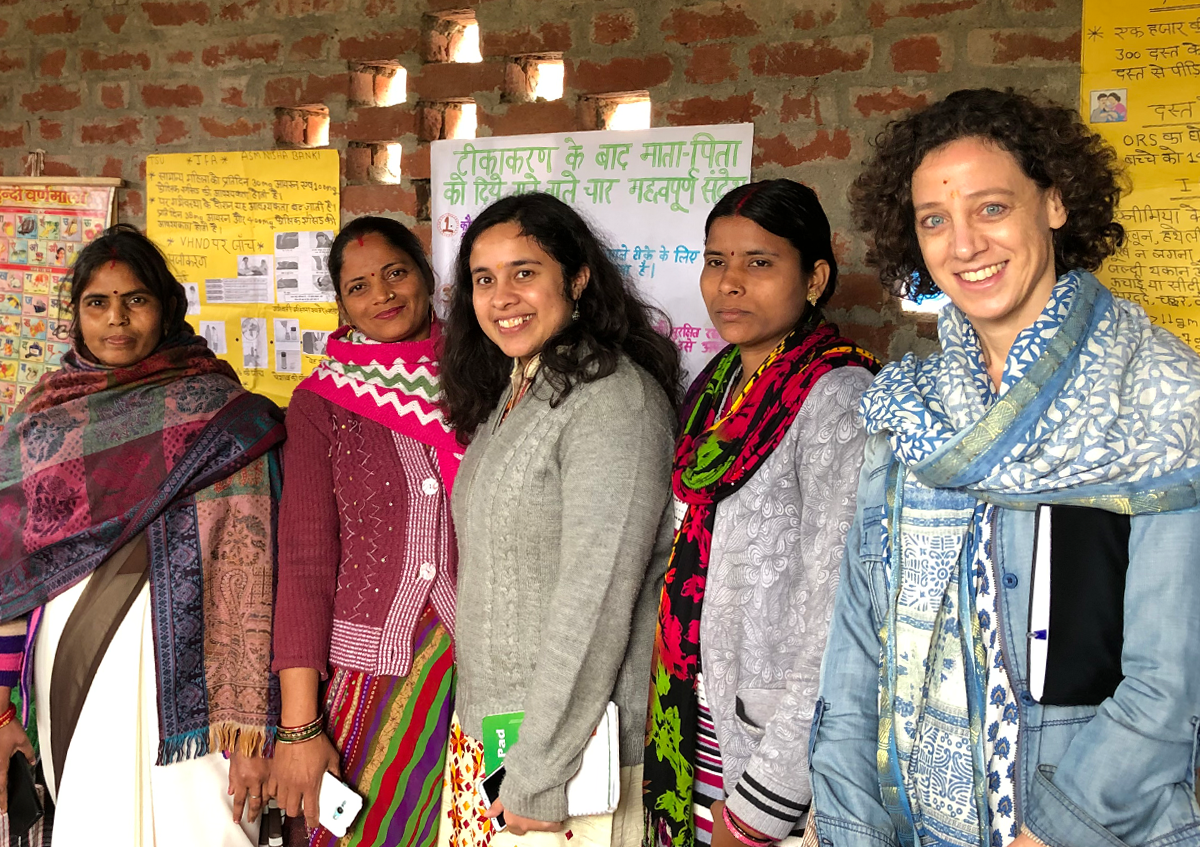
Dr. Marissa Becker (right) during a field visit in 2019 with health-unit staff and frontline health workers in a village in Uttar Pradesh, India.
UM helps with pandemic preparedness in India
A University of Manitoba-led health unit is helping the most populous state in India prepare for the escalation of COVID-19.
“India has been trying hard to address the pandemic, but the public health system is not as well equipped as it needs to be,” says Dr. Marissa Becker, an infectious disease specialist and associate professor of community health sciences, internal medicine and medical microbiology.
Becker, a UM alumna in medicine, works for the UM Centre for Global Public Health (CGPH), which is part of the Rady Faculty of Health Sciences. She, her husband and their two sons have lived in India for the past two years.
On March 23, with just five hours’ notice to pack up and catch a departing flight, they followed the Canadian government’s advice to return to Manitoba. India is now under a nationwide lockdown to limit the spread of the coronavirus.
Becker is now in post-travel self-isolation at a family member’s house in Winnipeg. She is determined to do as much as she can to keep supporting India’s pandemic fight via email, phone and videoconference.
“I had very mixed emotions about leaving,” she says. “I hope to get back as soon as I can. We’re all in this together.”
The state of Uttar Pradesh in northern India has a population of roughly 223 million. The University of Manitoba leads the Uttar Pradesh Technical Support Unit, funded by the Bill & Melinda Gates Foundation.
The unit, established in 2013, employs about 1,200 people. It works in partnership with the India Health Action Trust to support the Uttar Pradesh government in strengthening maternal and child health, nutrition and family planning.
A number of faculty members from the CGPH, including Dr. James Blanchard, director of the CGPH, and Dr. Stephen Moses, associate director, travel regularly to Uttar Pradesh. All have left India for the time being.
In light of the pandemic crisis, Becker says, the Technical Support Unit has responded to the Uttar Pradesh government’s request for help with urgent priorities such as assessing medical supplies and health facility preparedness, creating a state-wide command centre and setting up a call centre.
“We’re applying our health-system expertise to analyzing data on things like the supply of hospital beds, ventilators and personal protective equipment for health-care providers,” Becker says.
“We’re developing a phone line similar to the Health Links line in Manitoba, where people can call with questions related to COVID. A key concern is making sure people in the rural and remote areas can access the call centre and get information in a timely manner.”
The unit is also producing guidelines for health-care facilities on procedures such as infection control and managing patients with COVID-19.
The professor has high praise for the Technical Support Unit team and health workers on the ground in Uttar Pradesh. She herself is based in Delhi, a city of more than 20 million people.
She works in a six-person office that supports all the health projects in India in which UM is involved, including HIV units in Delhi and the state of Karnataka, and a new unit to support public health in the state of Madhya Pradesh.
Becker hopes to play a part in Manitoba’s pandemic-fighting effort as soon as she’s out of isolation. Meanwhile, her thoughts are with her friends and colleagues in locked-down India. The country’s dense population, widespread poverty and inequitable access to health care pose daunting challenges during the pandemic and lockdown, she says.
“I think of all the people who are daily wage labourers, not being able to go to work and buy food,” she says. “Crises like this always hit the most vulnerable the hardest.
“Ever since the U of M started to partner in improving public health programs in India nearly 20 years ago, reaching those who are most vulnerable has been one of our core principles.”






